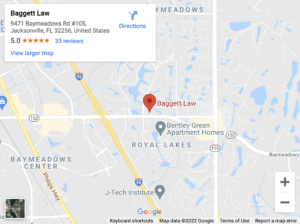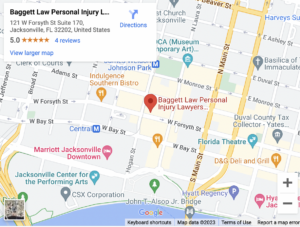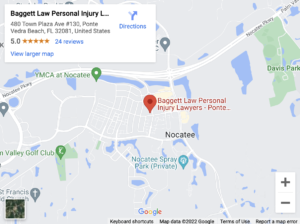
After someone injures you in a car accident, you will probably face losses. You will have medical bills for treatment, therapy, and medication. You will also endure pain and mental anguish.
If you had pre-existing conditions at the time of the accident, the insurance company might deny your injury claim. Insurers will only compensate you for injuries caused by the accident. As a result, you need to show how your accident worsened your pre-existing conditions to receive injury compensation.
Read on to learn when you can get compensation for pre-existing conditions after a car accident in Florida.
Auto Insurance in Florida

After a car accident in Florida, you can almost always seek injury compensation. Florida has a no-fault auto insurance system that guarantees injury compensation even if you caused the accident.
Under this system, you must have personal injury protection (PIP) coverage to register a vehicle in the state. This coverage pays benefits to you if you get into a car accident, regardless of who caused it.
The flip side of no-fault coverage is that as many as 10% of PIP claims may involve fraud, and up to 30% of PIP claims may involve overbilling. As a result, Florida has considered repealing its no-fault insurance system many times, most recently in 2021.
Suspicions of fraud have also had two other effects:
Limited Benefits
Under Florida law, your no-fault insurer only pays 80% of your medical expenses and 60% of your wage losses. Florida already has a $10,000 policy limit on your PIP benefits. This means that you would need to incur $12,500 in medical expenses to receive your full $10,000 medical benefit. But you would have to pay $2,500.
In essence, Florida requires you to pay a 20% copay after a car accident, even if someone else caused the accident. In some cases, you can skip the no-fault system or seek reimbursement of your out-of-pocket medical payments.
Specifically, if you suffered a significant, permanent injury, you can skip the no-fault system and pursue the at-fault driver for compensation. And if your medical expenses exceed policy limits, you can pursue the at-fault driver for the difference.
Claim Denials
The other consequence of the high rate of fraud is that no-fault insurers deny a lot of claims. To file a claim for PIP benefits, you must show that your accident caused your injuries and that your treatment was reasonable and necessary.
If you have pre-existing conditions, your insurer can deny your claim because your injuries resulted from something other than your car accident.
Suppose that you tore cartilage in your knee while jogging. An insurer can deny your claim for a knee injury after a car accident on the grounds that your knee pain comes from your jogging injury and not your car accident. To overcome this denial, you must show that the car accident made your knee worse.
If your knee ligaments were sprained in a car accident, the insurer must cover medical expenses relating to the knee sprain. It does not need to pay for medical expenses relating to your torn cartilage if that condition was not affected by the accident.
The Effects of Pre-Existing Conditions on Fault-Based Injury Claims
As mentioned previously, Florida allows you to file a claim against the at-fault driver in limited situations. To get compensation from the at-fault driver and their insurer, you must prove negligence.
Negligence requires proof of four elements:
- Duty
- Breach
- Causation
- Damages
If you have a pre-existing condition, you could face challenges proving causation. In negligence law, causation has two parts:
Proximate Cause
The injury must be a foreseeable result of the at-fault driver’s actions. This does not mean the at-fault driver must have foreseen your specific injury. Instead, it means that the at-fault driver’s actions must be the type that could reasonably and foreseeably injure someone.
An example is when a driver runs a red light and then crashes into your vehicle, injuring you in the process. It’s reasonably foreseeable that running a red light could result in this type of accident and harm, and so the proximate cause requirement would likely be met.
Cause-in-Fact
The at-fault driver’s negligence must also fall within the factual sequence of events that ended with your injury. This portion of the causation element could also cause problems if you have a pre-existing condition.
If you suffered a work-related accident a few years before your crash and have occasional back pain, the at-fault driver and their insurer will argue against liability for any back injuries because of your pre-existing condition.
On one hand, this is fair. If the at-fault driver did not cause your back injury, their insurer should not have to pay for any expenses relating to it.
On the other hand, the at-fault driver should bear liability for any injuries they did cause. You should not have to bear the cost of a new car accident injury simply because you had previously suffered a similar injury.
Again, the solution is to prove that the at-fault driver’s negligence affected your health despite your pre-existing condition.
You can seek compensation when the accident:
- Worsens your pre-existing condition
- Aggravates or causes a flare-up of your condition
- Causes a related, but not identical, injury
In these circumstances, the at-fault driver and their insurer must pay the losses relating to the harm the accident caused to you. But they do not need to pay any losses relating solely to your pre-existing condition.
The Role of the Injury Lawyer
A car accident lawyer plays an important role in these cases. You need evidence showing that your symptoms after your car accident resulted from the accident rather than a pre-existing condition.
An injury lawyer can comb through your medical records to make a case distinguishing your accident injuries from any prior injuries or conditions. A lawyer can also find expert witnesses who can testify that your current symptoms resulted from a new or worsened injury rather than an old injury.
To discuss how your pre-existing condition might affect your injury claim, contact an experienced personal injury lawyer today from Baggett Law Personal Injury Lawyers by calling us at (904) 396-1100 to learn more.




